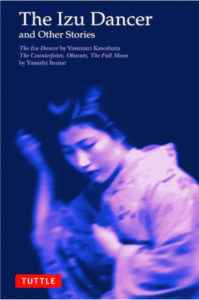Yasunari Kawabata and Yasushi Inoue
This is a collection of four short stories by the two authors above. The stories are literary fiction, in other words: Not much is happening, really, but they provide an interesting glimpse into the Japan of the 1950s.
The Izu Dancer was the first story by Kawabata to appear in English; the foundation stone of international fame that eventually led to the Nobel Prize in 1968. It’s about a troupe of dancers from the Izu Peninsula who travel through Japan in summer to make money. The youngest one catches the eye of an equally wandering student, but when he finds out that she’s only 13, he is content with sharing the road only.
The other stories are all by Yasushi Inoue.
The Counterfeiter describes the life of Hosen Hara, a childhood friend Keigaku Onuki. While both show artistic talent from a young age, it is the latter who becomes a famous painter. The former eventually produces forgeries of his friend’s artwork. Inoue asks the question whether this outcome was inevitable.
In Obasute, Inoue traes the legend of abandoning old people on a mountain and relates it to the inner dynamics of a family: Their matriarch has just turned 70 – the age for the legendary abandoning – but at the same time, his younger sister abandons husband and children to pursue her own life.
The Full Moon details the rise and eventual fall of Kagebayashi, who is made president of a company just before the annual moon viewing celebrations. We hear about leechers and hangers-on as well as of his enemies, all this with the backdrop of the harvest full moon. One of them will be Kagebayashi’s last…
While Kawabata has become famous as the first Japanese to win the Nobel Prize for Literature in 1968, Yasushi Inoue is less known abroad. He is, nevertheless, considered one of Japan’s greatest modern novelists and his work has received numerous awards: The Akutagawa Prize (1950 for The Hunting Gun), the Mainichi Press Prize, the Kikuchi Kan Prize to name just a few. Born in 1907 in Hokkaido, he died in 1991.
Discover Inoue and get the four stories from amazon.

